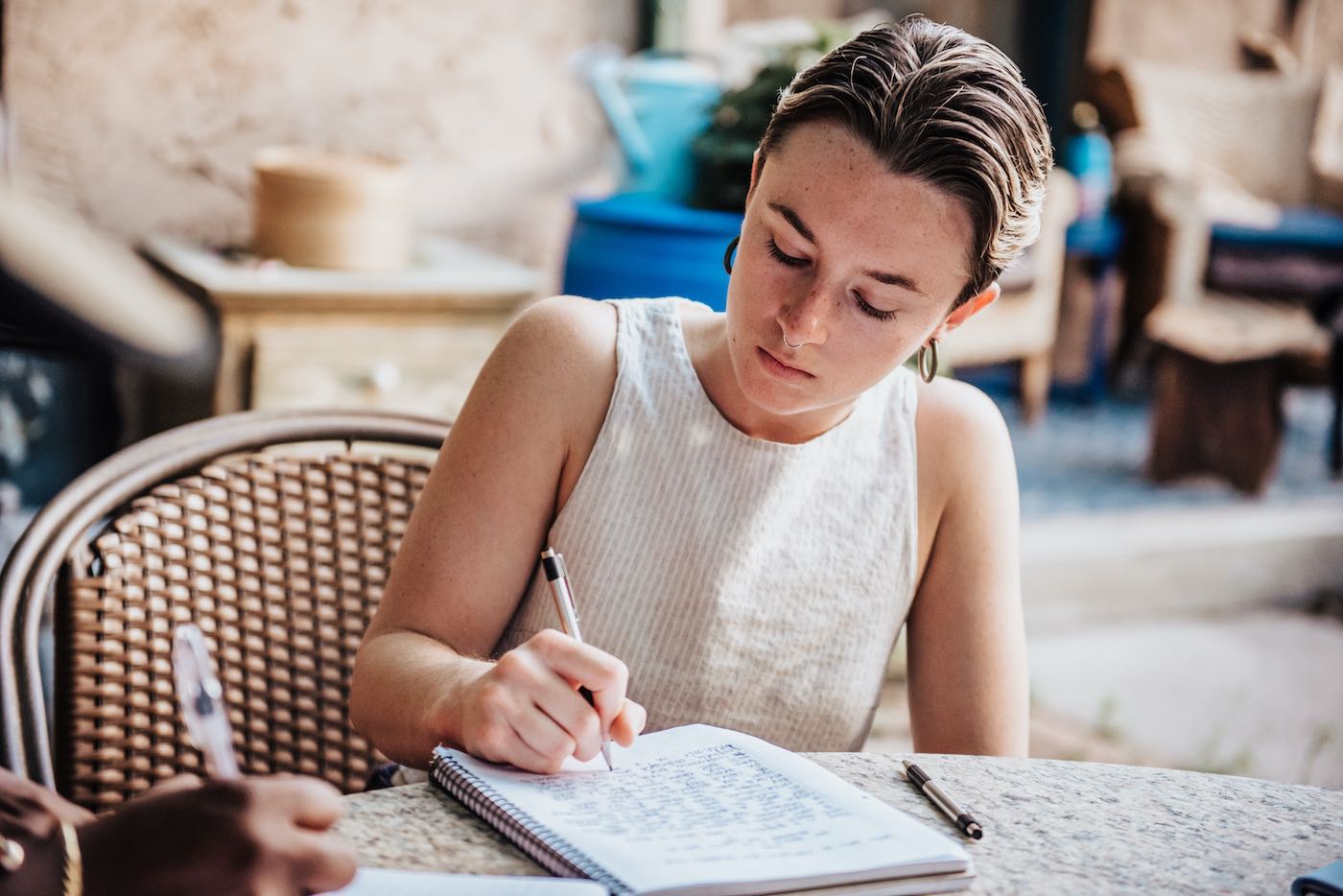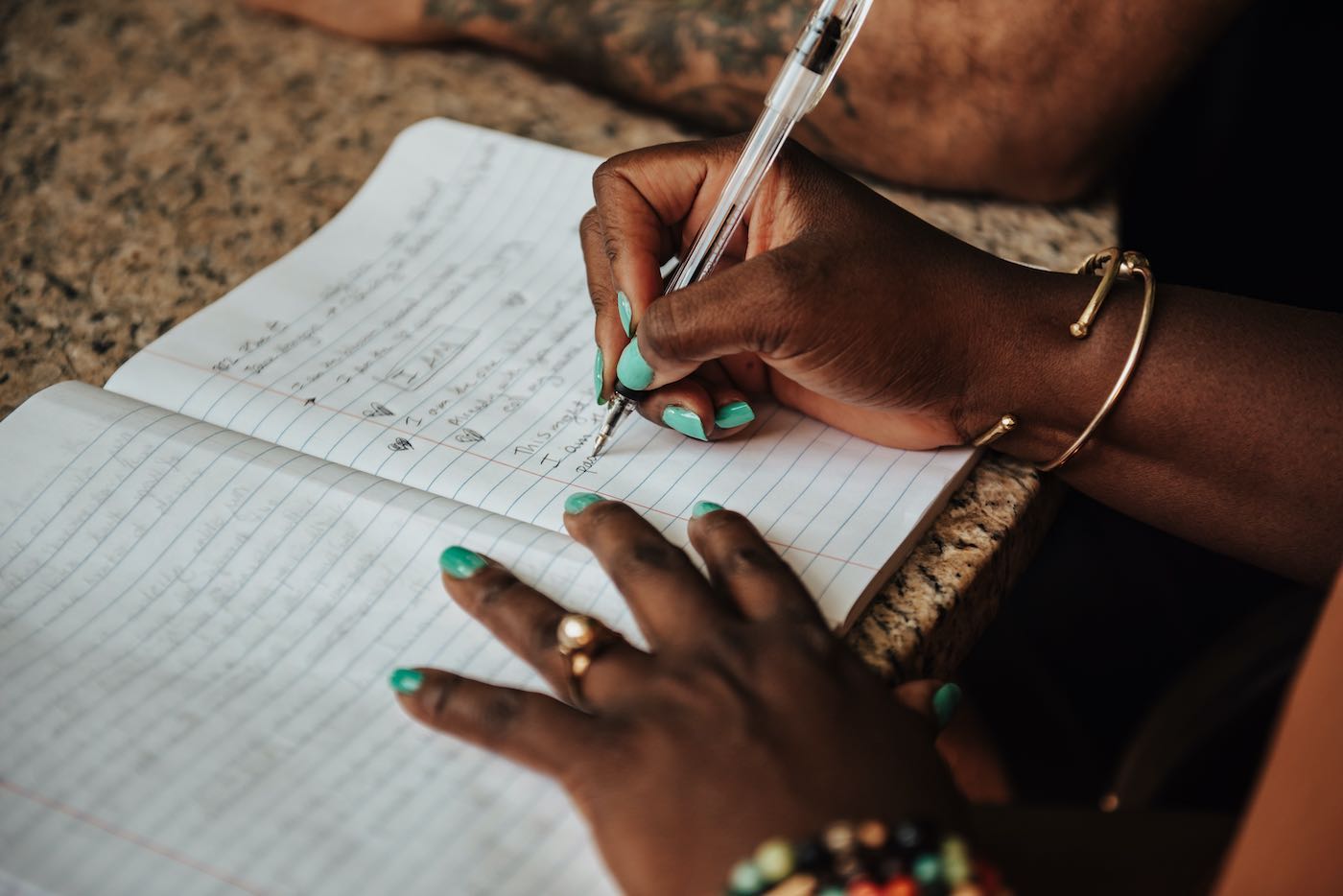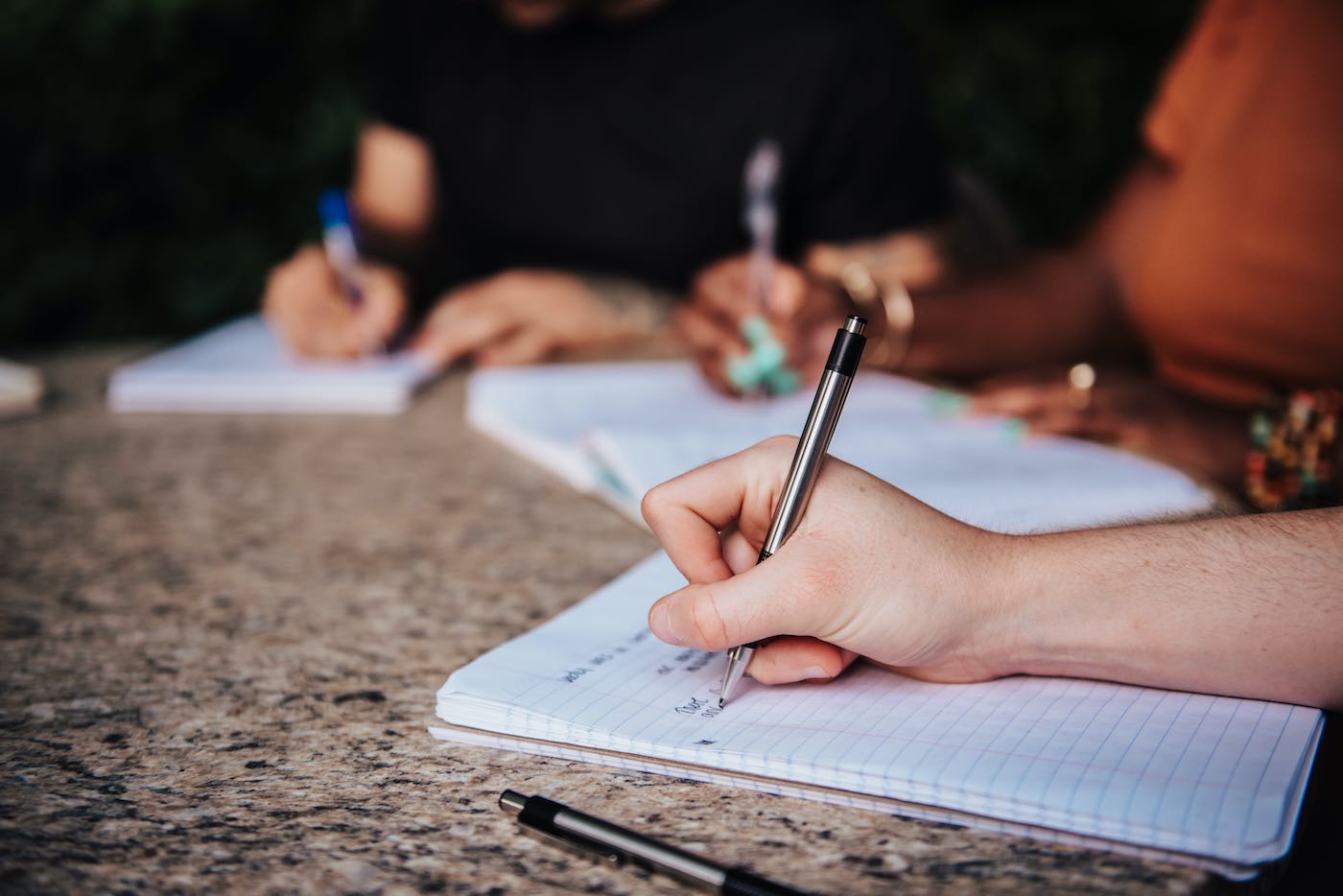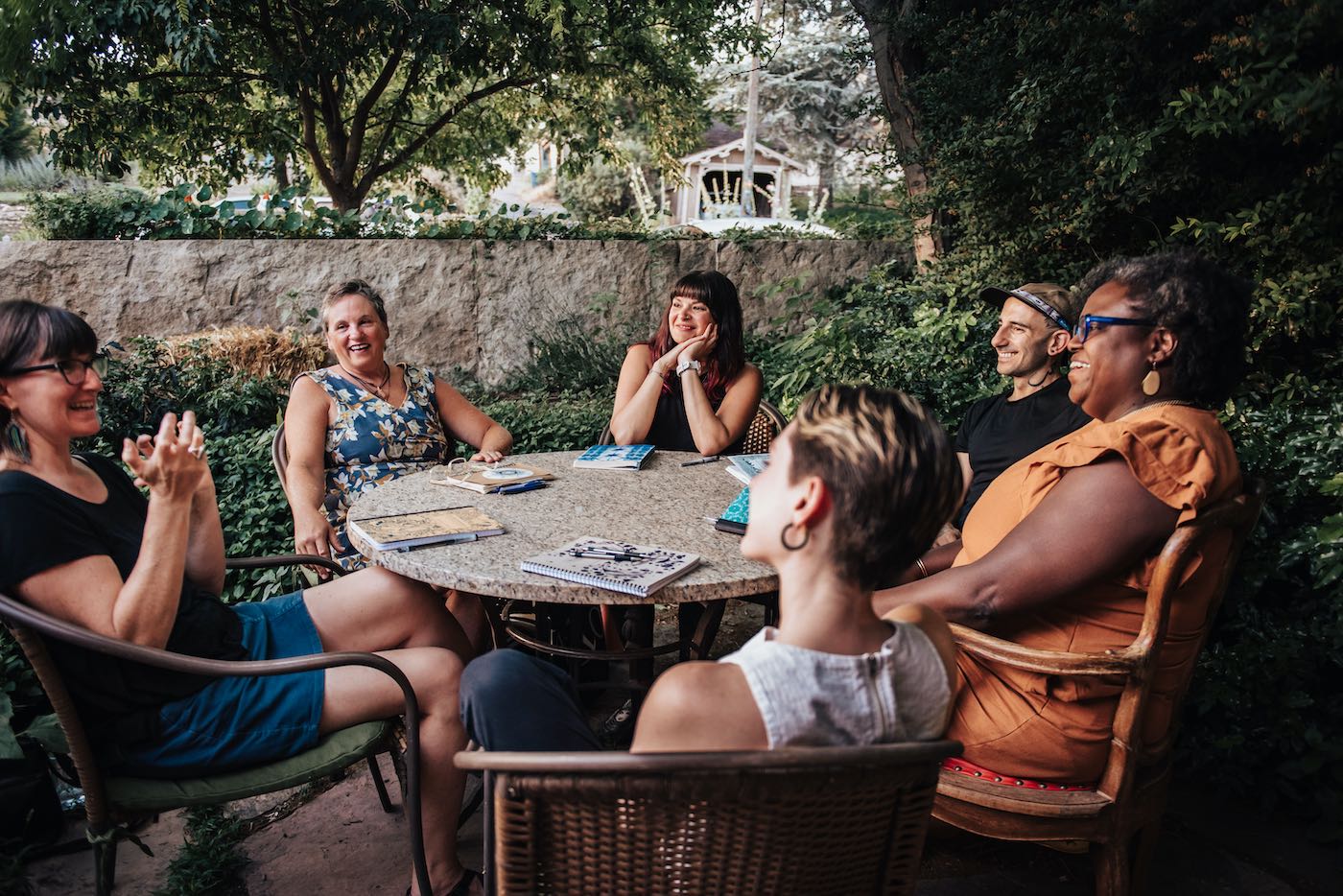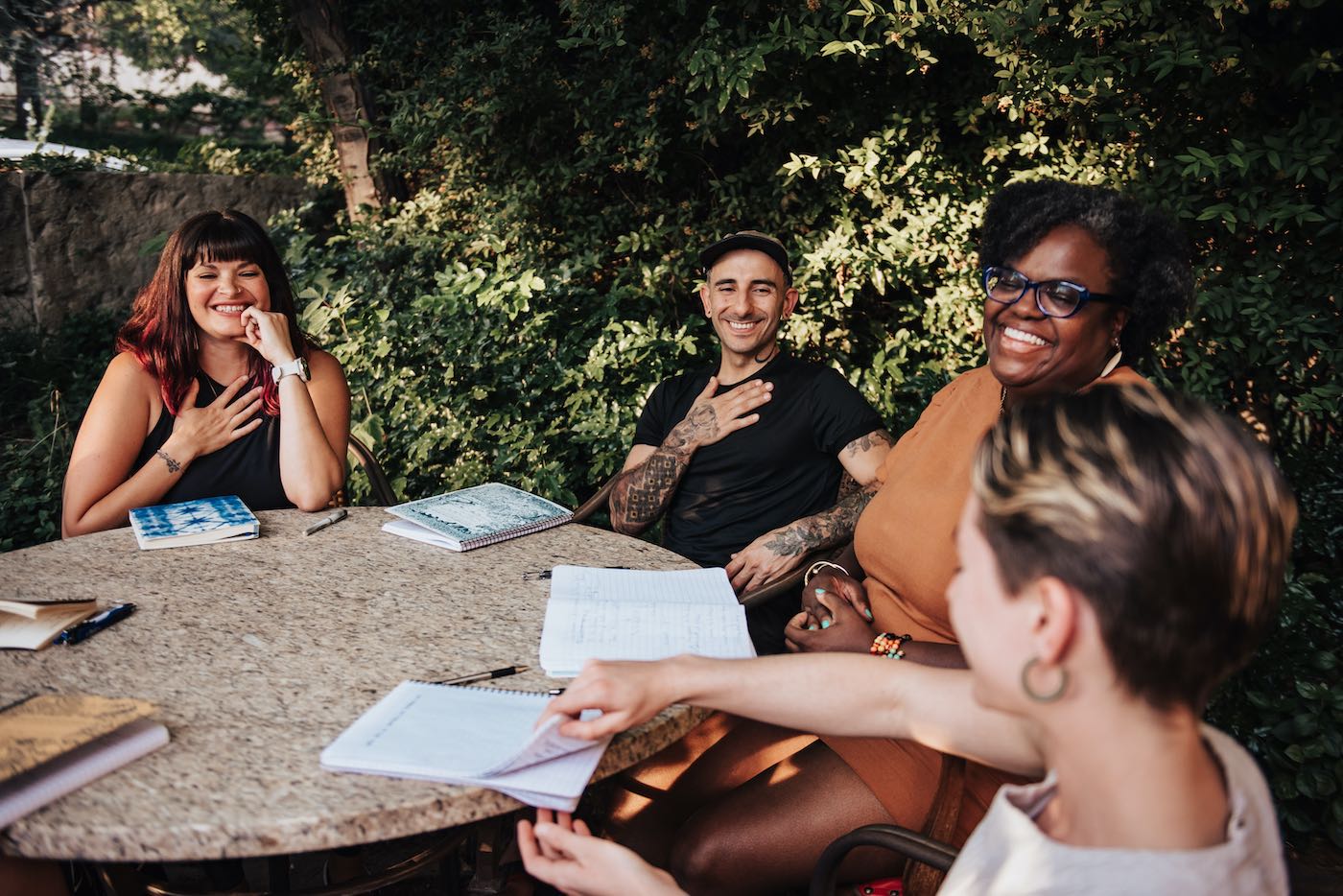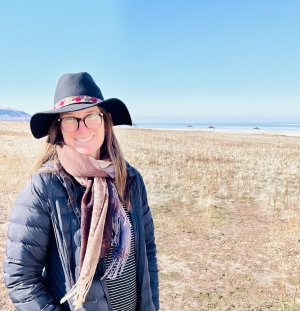Nan Seymour
Video Lessons
2/15/21 Preparing to Facilitate on Zoom ( Tools & Tips)
2/22/21 Tiff & Nan Talk Poetry: A conversation on finding, stashing, and tracking poems for River Writing.
3/1/21 A Closer Look at a Practice Session: A specific look at each part of a practice session, featuring some excellent tips from members of the cohort.
3/8/21 Lesson on Call to Presence with Scott Moore: Inviting ourselves and others to breathe, welcome, recognize, and witness.
3/22/21 Discussion with Kim Pederson.
4/26/21 The Rich Gift of Whole-Hearted Listening with Nini Rich
Practice Session Outline (step by step)
Preparing for your Practice Week:
Before:
- Consider lighting
- Consider Background
- Set Your Pronouns on Zoom
- Familiarize yourself with Zoom overall (mute, chat)
- Send Warm Welcome Note w/link to Participants
- Limit Your Own Distractions, Turn of Notifications
- Gather your tools: timer, paper, several good pens.
During Your Session:
- Join the Zoom meeting at 6:15pm MST for a little grounding before your session begins.
- Call to presence.
- Call the circle, inviting everyone to share their name, pronouns, and a brief reflection.
- Invite the Seven Agreements with a single sentence each.
- Offer Practice Instructions
- Invite a short list (optional)
- Offer a Poem and prompts and invite one round of Writing to Discover (7 minutes)
- Invite a 5 minute break. (You may wish to play a song.)
- After the break, share community announcements: Confluence, What's Up Next...
- Lead Second Round of Writing to Discover (5-9minutes, depending on time)
- If you have time, conclude with a blessing poem or a check-out with the circle.
- You will facilitate the entire session until approximately 8:15pm MST. (Nan & Tiffany will lead some reflection until we end at 8:30pm.)
- Plan to stay on the meeting with Nan & Tiffany for 30 minutes of post-session reflection.
Next Day: Send Follow up Letter. Examples in the Reservoir.
Poetry & Poetry Resources
Essential Poems (and poets):
Becoming A Horse by Ross Gay
Kindness by Yusef Komunyakaa
Balance by Dorriane Laux
Kindness By Naomi Shihab Nye
Instructions on Not Giving Up by Ada Limón
When Giving is All We Have by Alberto Ríos
Like You by Roque Dalton
At Last the New Arriving by Gabrielle Calvocoressi
A Great Wagon by Rumi/Coleman Barks (either half)
A Community of the Spirit by Rumi/Coleman Barks
Dream Variations by Langston Hughes
won’t you celebrate with me by Lucille Clifton
This Room and Everything In It by Li-Young Lee
The Nutritionist by Andrea Gibson
How to Pray by Annelyse Gelman
Minneapolipstick by Rachel McKibbens
Poetry Resources
American Academy of Poets
Brain Pickings
Button Poetry
Cave Canem
Copper Canyon Press
Poetry Foundation
Poetry Unbound
Rattle
River Writing Anthology of Black Poets
Queer Black Poets Since the Harlem Renaissance: A Reading List
The Sun Magazine
Tiffany Recommends:
Gratefulness.org
Rosemerry Wahtola Trommer - she sends out a daily poem via email which I highly recommend subscribing too.
Maya Stein
Poems from The Current
4/12/21
Water Table by Billy Collins (Giuliana)
Twilight from the Window of my Mother's Hospital Room by Ellen Bass from The Human Line (Karen)
No More Elegies Today by Clint Smith from Counting Descent (Jess)
Invitation by Aimee Nezhuqumatathil (Debbie)
Earth Your Dancing Place by May Swensen (nan)
4/19/21
New York by Alex Dimitrov from Love and Other Poems (Jess)
Your Life by Andrea Gibson from Lord of the Butterflies (milo)
In Common by Czeslaw Milosz (Giuliana)
Summering in Wildwood, NJ by Kaleb Rae Candrilli (nan)
6/15/21
Dust by Dorianne Laux (Debbie)
How Far Away We Are by Ada Limon from Bright Dead Things (Nan)
radical gratitude spell by adrienne maree brown from pleasure activism (Moudi)
Perseverance by Deborah Paradez (Giuliana)
Change the Lighting by Brooke McNamara (Tiffany)
Hours Days Years Unmoor Their Orbits by Racehl Zucker from She Holds the Cosmos, Poems on Motherhood (Rachel)
What Can I Gain? What Can I Lose?
What can I gain, and what can I lose by looking at and discussing racism within my world?
From Ari:
"I can gain a deeper connection to the world around me. A deeper understanding, an awakening that will refuse to sleep again. I can gain a sense of responsibility and clarity as to what actions of mine, what beliefs of mine, and what systems I participate in or gain from are perpetuating racial discrimination and persecution. I can find the anger, the sorrow, and the courage necessary to pop out of generational, systemic white supremacy.
I can lose my self-righteous assumption that I am not part of the problem. I can lose my sense of righteousness and goodness and ally-ship that I have not earned. I can lose my fear of not being right. I can lose my shame, so carefully sheltered by blame. I can lose friends. I can lose comfort in spaces I never considered uncomfortable before. I can lose sleep, and peace, and assumptions of liberty and justice for all."
From Deandra:
My initial thoughts on this topic actually happened when I first read How to Be an Antiracist. I was sitting down in the “check my privilege” activity and then considering where I can be a antiracist force and I had this brief fear. I’m not proud of it, but for a moment in my mind I heard this thought about how doing this might put me in more situations where the people around me didn’t look like me. How would I relate? how could I find my footing when I didn’t have some understanding of where everyone was coming from? In the end...isn’t that what we gain? I think now, months later, I’m coming into this question with a lot more critical thought and understanding.
There are two separate worlds for me. Life and work. Life is my family, my kids. I want my kids to be good people. I want them to be full of kindness and ready to take on the world bravely. We all want that, right? By looking at and discussing racism in my household, in my own demeanor, in the organizations I plug into and involve my children in, I can gain paving their path to doing good work. To seeing when something in front of them is racist and calling it out, maybe even dismantling it. What do I lose? Maybe...the “easy way.” It’s so much easier to just say every one is equal and treat ever person the same. As we have learned, it can’t stop there. If it stops there, then we are blind to the “system” of racism. Treat every person the same as much as you want, that doesn’t mean we live in a society that will afford them the same opportunities based on their skin color or any multitude of factors, and that’s where we make a difference. Teaching that is not going to be the easy way.
My other world is my work. I am a leader in a retail store and I work in loss prevention, a field called out so many times in the stories about being unjustly followed or detained. There are regularly life experiences or articles in the news about people in LP making bad choices. Intent aside, the impacts are high. I see it at my obligation personally to call it out when I see inequities, advocate for people who need it, and be a part of the solution. I want to be able to train new people with the bar set. With real conversations about racism in our field. I want to use my frequent interaction and rapport with local law enforcement to examine their policies and individual opinions and have real conversations. I’m proud of the police I work with and consider them my safety lifeline if something happens in my store. I’m saying a lot...I can gain so much by directly addressing racism in my world. Those conversations aren’t always easy. I might lose some reputation with certain partners if I do it the wrong way. I might make some people mad because I won’t let up. I might even step on toes (how do I make sure my voice belongs in the room??). I’m fortunate enough to believe I am in a position where I wouldn’t lose my job for bringing this up and discussing it, but I do have to be careful how I do it.
From Maggie:
I realized that in order to address my racist views, I cannot stay under my privileged pillow and go back to sleep, this feels both like a loss and a gain. A gain, continuing to grow, challenge myself, continue to work for a more just society, continue to face my own racism and continuing to shed the racist lies I was taught in history class, and in my oh so privileged white bubble in which I was raised.
A loss because that privileged pillow has a bit of comfort. Staying unaware does have its attractions. But, at the end of the day, the gains do outweigh the costs and I will continue to use my privileged platform to help inform myself and others in my community.
From MaryBeth JC:
I’m reframing this question. When I sat down to write about it, I decided to start with the losses first, so I could finish with good news. I instantly realized that I don’t want to think in terms of losses and gains, but rather in terms of changes, stretches, discomfort and growth. What might change if I continue to look deeper at racism and discuss what I’m learning about race and racism? Some friends and family members might grow tired of the topic. Some white friends and family members might have reactivity, might feel defensive, might think that I am calling them wrong or bad if I point out the potential impact of their words, beliefs and actions. I might feel some discomfort and embarrassment about discussing race in person and on social media in the presence of people of color – a worry that a person of color might call me a poser, a phoney, a worry that a white person might call me a hypocrite. I risk having my statements about race noticed by other people who might correct me, might point out gaps in my understanding, might point out that I’m approaching anti-racism from a white-supremacist lens that’s so deeply ingrained in me that I’m unaware of it. I surely will encounter many opportunities to pause and examine the impact of my own words, beliefs, and behaviors; opportunities to dig deeper and deeper; opportunities to work with nuance and complexity. I will surely encounter shame, within myself and other people. I will have rich opportunities to practice within myself and strive to offer practices to other people to meet the experience of shame and not collapse, shatter, shrink, look away, erect defensive barriers or launch offensive pushback against the internal discomforts of shame. Some people might hate me for this; other people might feel grateful for the support I hope to be able to offer. I risk the necessity of expanding my sphere of action – beyond my inner life, beyond the small circles of my family and friends, beyond the small circle of my students – to include civic action, speaking at public meetings, contacting organizations, lawmakers and policymakers. I stand to gain a sense of satisfaction that grows from practicing accountability and maturity. I stand to gain increased humility that grows from a willingness to receive correction and reframings and education from other people who see the world through different lenses than I have been accustomed to. I risk discouragement over the entrenched condition of systemic racism and the violent backlash from white people that has always greeted any progress toward racial equality in this country. I stand to gain a deeper and deeper settling of my nervous system as I grow a capacity to face unpleasant realities, with clarity, maturity and compassion. I stand to expand my opportunities to tell myself and other people: “Your worthiness to give and receive care and respect is innate and immutable. It is not dependent on how you yourself or anyone else perceives you, labels you, treats you or mistreats you. There’s nothing you have to do to earn this worthiness, and there’s nothing you could ever do to lose it.” My hope is that practicing and spreading this idea of innate, inalienable worthiness will help individuals and societies to acknowledge and redress long-standing wrongs, working toward a healthier, happier, safer, fairer, more sustainable world for all of us.
What I’m really trying to say is that I hope to help myself and other people, particularly white people, recover from “but I’m a GOOD PERSON!” addiction. I hope to help myself and other people grow a deep embodied belief that “I’m neither a good nor bad person. I’m a person worthy of giving and receiving care and respect. I’m an emotionally sturdy adult, capable of examining the impacts of my beliefs and behaviors, capable of acknowledging the intentional and unintentional harms that I have caused or perpetuated, capable of perpetually working toward more fairness, more accountability, more acceptance, more shared joy.” I could gain more joy through exposure to more diverse customs, cuisines, literature, music, fashion, art!
From Nan:
As I discuss and face systemic racism I hope to gain a better world. To say it another way I hope to help compose the world I already love, a world defined by authentic inclusion and connection. I hope to contribute to a community-consciousness big enough to include every one on equal ground in all settings and places.
I will lose the regard of some people. I expect to continue losing sleep and my sense of comfort. The more I look at systemic racism in our history and culture, the more I feel all the floorboards of our institutions are rotten.
I hope to gain more muscle as a facilitator in order to continue holding space in which the work can happen. I hope to gain ability to hold steady as I witness the weather, the hailstorms and rage that seem related to white shame. I hope to gain boldness in order to hold institutions and systems accountable. To the degree that we succeed in this work, I’ll lose my privilege over others. I want to robustly welcome this, but I've barely been tested and I imagine I’ll experience more awkwardness and discomfort, more difficulty.
From Jess:
What might I lose?
- My ego and sense of identity
- Acknowledging my own personal moral failures of the past - that I wasn’t actually a “good person” in terms of my relationship with oppression or oppressed people. Despite my position about injustice, my actions have been limited and sporadic. This is absolutely true. I did see numerous incidents of police brutality over the years. I’d experience rage or grief, but do absolutely nothing to ensure it wouldn't happen again. It would be easy to get bogged down in shame and guilt about that, but I don’t really, because it’s counterproductive and I am taking corrective steps.
- My experience of being centered at least as far as race goes in all public spaces - like the media (commercials/movies/talk shows/news/magazines) and in power structures (CEOs, legislators, police). While I often have a feeling of disqualification based upon my gender in these spaces, I experience familiarity and inclusion as a result of my whiteness. The distance is there, but seems possible to traverse to enter the space. When I enter spaces where I am not centered in this way, I feel smaller and less powerful and have to surrender to that experience.
- Making decisions that are self-oriented without critical review. It’s a kind of mental laziness on my part, resulting in part from overwhelming confusion about how to make good choices in the modern world with so many variables and gaps in information to know which thing is worse (take any act of commerce: sourcing materials, production, transportation, distribution, lifecycle, etc). This can lead to throwing up my hands.
- Money, as an expression of my already limited sense of power - Supporting organizations and individuals who are doing activist, legal, community service support work requires money, just like supporting people contributing to a vibrant culture through Patreon etc. There are so many worthy groups and individuals. Or by supporting the case of reparations, which has undetermined funding. But the actual loss here is that taking on this work means making choices about what matters most to me in a hierarchy, which is a zero sum game, and already incredibly painful.
- Time - We are finite creatures with limited energy and focus. As a person with mental illness, my capacities are further constrained. Learning and building new competencies takes time and energy and hopefully great teachers, as this class has. What do I give up to make space for this? My exercise routine? My after dinner hang-time with my kiddo? I’m so unskilled at it that everything is slow now. Today, it was lunch. I spent an hour carefully crafting an email to our Diversity & Inclusion group at work, pointing out the inconsistency in standing up for rights for queer people/women but not for Black people in order to “avoid politics” and not ruffle feathers. Because I wanted to strike a tone of friendly engagement that was very pointed (that’s not a skill yet) it took much longer to determine the most effective approach. Hopefully I’ll integrate skills to address this.
What do I gain? From this vantage point, it looks like this:
- Deeper understanding of the world I am already in, my place in it, and opportunities for impact.
- Self-respect as a person who follows her own moral compass
- Reformation of core identity as a person who is in the arena, affecting change.
- Hopefully, a world that is tilting towards love, towards justice. One more like the one I want to be in. A reduction in suffering. This is the whole thing, honestly.
- Hopefully, friends and community to share in this.
From Sherrill:
Over these months of reading, thinking, listening what is gained? A different eye that begins to recognize textures, boundless expressions of people. PEOPLE walking past me in stores, downtown, on the trails--the wealth and riot of skin tones, nose shapes, foreheads, ways that bodies move, smiles, concentrations, hair styles, clothing choices. They seem now as I notice a kaleidoscope every time I'm about in the world. Ross Gay would call this a delight and he would be right. Equally important but less perhaps a delight is the growing sense of depth of the history I carry in my bones. It's a history of a people, an ancestry that slips beyond the strictures of bloodline. I am connected to and carry the darkness, the trauma of commission from those ancestors I wish not to claim but carry in me. It is a gain to begin to fathom this because it opens me into a narrative of myself and others that takes more space in the way I live now. What I may gain or hope to gain is agency; perhaps a more vibrant, purposeful heartbeat for this last phase of my own life, my own piece of the narrative.
What I may lose....perhaps my church, which for 28 years now has been a fulcrum of my life. Trying to find my place now, what voice is...what? Real for me? The Social Justice Committee zeros in on hiring practices: Camp Henry; the new Admin Assistant and the leadership speaks of reason, logic, practicality, good intentions. I feel wound up in the strings of being a former staff member. The committee veres off into what I consider side-tracks as it heatedly debates the 19th century "white Jesus" stained glass windows. What could be lost is, of course, relationships of ease, comfort, time. What could be lost is my own sense of trajectory and potential agency in the mire of groups trying to figure out action, movement in ways that seem to turn us in circles. I lose my sense of myself as a calm, confident and skilled leader--a teacher. I have no skill for leadership in this and am struggling with how to listen and to whom.
From Jean:
How I will benefit feels obvious in a multitude of ways and I don’t want to engage in that exercise. It won’t help me dig deep which is my singular desire as I explore these issues in this class. So, I’ll jump right into what can I lose.
As I’ve pondered this question for almost a week, I kept saying to myself that I won’t lose anything. The answer would be “nothing.” This question doesn’t pertain to me. I’ve tried to push-back on that as I approach the upcoming “deadline.” J
In my life right now, I don’t interact with people in any groups or workplace where I run into racist people (beyond how we each carry this aspect having grown up in this society). My position in my current life is such that I only interact with people I choose to do so with.
So, how could I lose anything?
I decided to focus on my area of work: Writing for young children. I always make sure in my books and in my author presentations at schools to be anti-racist in what I say, who I call on and even in where I offer to do presentations. And I of course make sure all my books don’t have racist elements, even ones that may be buried or subtle. I insist that my illustrator portrays a racially broad and inclusive set of people.
What I have NOT chosen to do is to write books that focus on racial justice issues head-on. My “brand” (as created by my agent and publisher and my own inclinations) doesn’t do this. So, in attempting to write about racial justice issues head-on, I have on reflection, figured out I DO have something to “lose.” Years ago as a community and union activist in Atlanta where racial justice issues are front and center on every element of social change movements, I remember an African-American activist challenged us white activists to work in our own communities. Our white communities. That was where they could not work and that was where much work was needed.
So, picking up that charge now in my work, I want to attempt to handle racial justice issues in the Children’s Lit. World. Back to the question: “what can I lose” by doing so? I could fumble. I could unintentionally not do an accurate job of being racially aware and sensitive. I could inadvertently portray stereotypes. And also I could be ineffective. I could fail. It could hurt my “branding.” But NOT attempting to do this is a cop-out, a white privilege cop-out. So . . . .
From Debbie:
I might gain truth. An opportunity to live in alignment with what's real and true and honest. I might lose the illusion, the distorted, delusional world I once thought was real.
I might gain a softer, more compassionate heart if I open it more fully to the truths of systemic racism and policies. I might lose the ability to turn away and ignore the suffering in my fellow humans.
I might gain new relationships and connections to new communities. I might lose outgrown relationships and communities.
I might lose the image of being good, and caring, responsible and right. I might gain wisdom from making mistake after mistake and still choosing to stumble my way towards racial equality and justice.
I might lose the familiar world of business as usual. I might gain a whole new world that my heart knows is possible.
Poetic Justice
Week One:
radical gratitude spell by adrienne marie brown
Week Two:
the earth is a living thing by Lucille Clifton
Bullet Points by Jericho Brown
Week Three:
In This Place (An American Lyric) by Amanda Gorman
Week Four:
A Small Needful Fact by Ross Gay
Week Five:
Coal by Audre Lorde
Week SIx:
Call Me By My Name by Déjà Baptiste from The Black Trans Prayer Book
More Please!
Anthology of Black Poets
On Being interview with Jericho Brown
Inaugural by Jericho Brown
Becoming a Horse by Ross Gay
Kindness by Yusef Komunyakaa
Participant Recommendations
- From Emilia:
- 'on listening' adrienne marie brown reading some of her most pivotal (in my mind) essays, and more.
- Poetry Unbound: Phase One by Dilruba Ahmed-- a beautiful poem and meditation on forgiveness of ourselves and others.
- On Being with Sharon Salzburg
- this article from adrienne marie brown's book ‘emergent strategy’ (11/10 recommend - a critical companion for me in this work): “there is usually a very small set of conversations that this particular group, at this particular moment in history, can have and move forward, given their capacity, resources, time, focus and beliefs”.
- From Nini:
- From Maggie:
- From Jean:
- From Jill:
- Elaine Jarvik's one act play about Ferguson:
- Nice White Parents (5 part podcast on racial disparity in education)
- Seeing White: An Introduction to White Privilege and Race
- From Rachel:
- The Show of Delights- This American Life A truly delightful episode featuring Ross Gay!
- From Debbie:
- Terry Tempest Williams advises: "I don’t think there is anything as powerful as an active heart. And the activists I know possess this powerful beating heart of change. They do not fear the wisdom of emotion, but embody it. They know how to listen. They are polite when they need to be and unyielding when necessary. They remain open, even as they push boundaries and inhabit the margins, understanding eventually, the margins will move toward the center. They are tenacious, informed, patient, and impatient, at once. They do not shy away from what is difficult. They refuse to accept the unacceptable. The most effective activists I know are in love with the world. A good activist builds community."I used to ask the question, 'Am I an activist or a writer?' I don’t ask that anymore. I am simply a human being engaged."
- From Beth:
Schedule + Links
Upcoming
March 11th Thursday 6-7pm MST — Confluence!
March 27th Saturday 1-4pm MST— Peer Reflection Session
May 23rd Sunday 10-4 MST— Practice & Practical Matters
May 23rd Sunday 6-7 MST Public Poetry Reading
May 23rd Sunday 7-8 MST Celebration of completion + Certification for TRUTR
Weekly Practice Sessions for TRUTR:
Weekly practice sessions on Tuesday evenings on Zoom from 6:30-8:30pm MST (Required for certification: participating in 10/12 sessions + leading an online session as the facilitator.) The facilitator of the week will stay on the call from 8:30-9pm for a post-reflection session with Nan & Tiffany.
2/16- Nan
2/23- Moudi Sbeity
3/2- Giuliana Serena
3/9- Sarah McCarron
3/16- Milo Wint
3/23 (break)
3/30- Amy May
4/6- Karen Bayard
4/13- Mary Ness
4/20- Rachel Bates
4/27- Michelle Vainright
5/4- DK Hawk
5/11- Beck Keilhorn
Topic: The River Under the River Weekly Session
Time: This is a recurring meeting Meet anytime
Join Zoom Meeting
https://us02web.zoom.us/j/89563998362
Meeting ID: 895 6399 8362
One tap mobile
+13462487799,,89563998362# US (Houston)
+16699006833,,89563998362# US (San Jose)
Dial by your location
+1 346 248 7799 US (Houston)
+1 669 900 6833 US (San Jose)
+1 253 215 8782 US (Tacoma)
+1 312 626 6799 US (Chicago)
+1 646 558 8656 US (New York)
+1 301 715 8592 US (Washington DC)
Meeting ID: 895 6399 8362
Find your local number: https://us02web.zoom.us/u/kbCbwNFK6e
Practice Sessions for Return to the River:
Sundays 2-4pm MST:
2/21: MaryBeth
2/28: Tiffany
3/7: Debbie
4/11: Jess
4/18: Nan
4/25: Paula
Weekly Options for Connection & Practice
The Current: Mondays Noon-2pm MST (TRUTR +RTTR)
Nan Seymour (she,her) is inviting you to a scheduled Zoom meeting.
Topic: The Current (for TRUTR +RTTR)
Time: This is a recurring meeting Meet anytime
Join Zoom Meeting
https://us02web.zoom.us/j/83666101614
Meeting ID: 836 6610 1614
One tap mobile
+12532158782,,83666101614# US (Tacoma)
+13462487799,,83666101614# US (Houston)
Dial by your location
+1 253 215 8782 US (Tacoma)
+1 346 248 7799 US (Houston)
+1 669 900 6833 US (San Jose)
+1 301 715 8592 US (Washington DC)
+1 312 626 6799 US (Chicago)
+1 646 558 8656 US (New York)
Meeting ID: 836 6610 1614
Find your local number: https://us02web.zoom.us/u/kbWF2ZPbhN
Currentology: Thursdays 11am MST (TRUTR only)
Mary Ness (she, her) is inviting you to a scheduled Zoom meeting.
Join Zoom Meeting
https://us02web.zoom.us/j/83704182050?pwd=T2IyaVZCelZSNTBnVVlJdXh0MXNnUT09
Meeting ID: 837 0418 2050
Passcode: 318402
One tap mobile
+14086380968,,83704182050# US (San Jose)
+16699006833,,83704182050# US (San Jose)
Dial by your location
+1 408 638 0968 US (San Jose)
+1 669 900 6833 US (San Jose)
+1 253 215 8782 US (Tacoma)
+1 346 248 7799 US (Houston)
+1 312 626 6799 US (Chicago)
+1 646 876 9923 US (New York)
+1 301 715 8592 US (Washington DC)
Meeting ID: 837 0418 2050
Find your local number: https://us02web.zoom.us/u/kcLMCptK1
Amy May
Through this practice, I've learned to lovingly set aside my inner critic in order to stretch into my own narrative. Finding my voice in this way has been nothing short of magical. I’m forever grateful to this community, and for the ability to share this practice with others. ~ Amy May
Amy May (she,her)
I finally joined a River Writing group in 2016 after being drawn to the practice but uncertain if I belonged. I was reluctant and terrified, but fortunately, I had enough curiosity about the practice to get me in the door. I wondered if it could really be welcoming to non-writers who want to test the waters like me (it is). I didn’t want to be humiliated by my lack of insight or flawed perspective (not possible in a community with such remarkable agreements). I didn’t want to take the place of a ‘real writer’ at the table (I now know that writers write, that’s all there is to it). I was pretty sure I didn’t even like poetry (I was so wrong). I even thought I’d never be able to read my messy handwriting (I was partially right about that, though it’s getting better all the time).
Through this practice, I've learned to lovingly set aside my inner critic in order to stretch into my own narrative. Finding my voice in this way has been nothing short of magical. I’m forever grateful to this community, and for the ability to share this practice with others.


